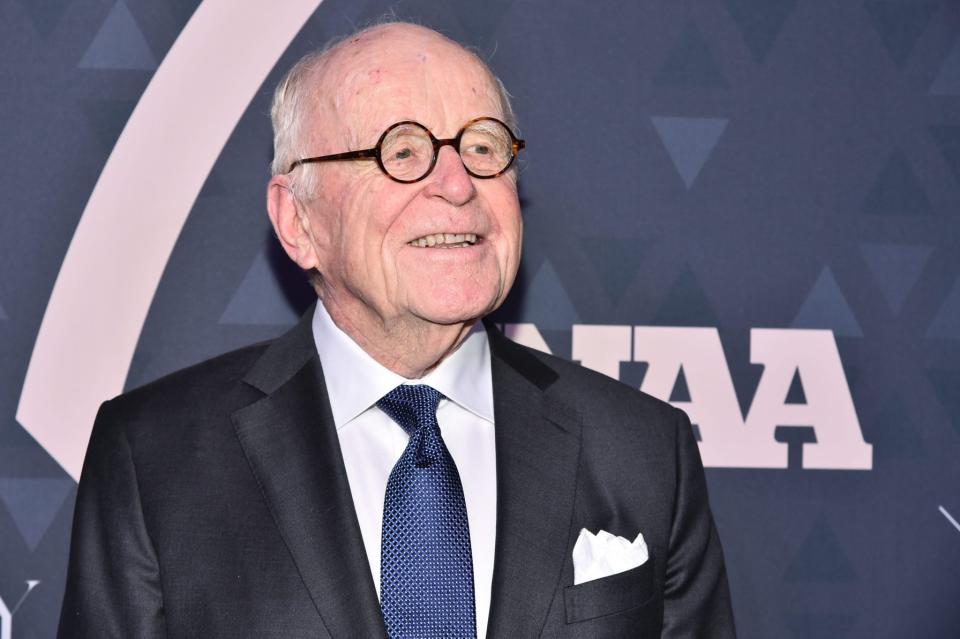The rise of Bruce Nordstrom, who once swept the floors of his grandfather’s shoe stores for 25 cents an hour—and climbed the ranks to build a multibillion-dollar retail empire

Bruce Nordstrom, whose grandfather launched the very first Nordstrom stores over a century ago, died Saturday at age 90. His death marks the end of an era for the 120-year-old company, leaving the fourth generation of Nordstroms to lead the family business.
“Our dad will be remembered not only for his significant contributions to Nordstrom but also for his unwavering dedication to his family and friends,” sons Pete and Erik Nordstrom said in a statement. “His passion, integrity and tireless work ethic served as an inspiration to everyone around him.”
In his 43-year tenure, Nordstrom saw his grandfather’s company grow from seven regional shoe stores to 156 department stores in 27 states, skyrocketing the company from $40 million in revenue to over $8.5 billion. Today, Nordstrom generates over $14 million in revenue from its over 350 locations, with plans to open 26 more locations by spring 2025. Forbes valued Bruce Nordstrom’s net worth at $1 billion this year.
“I liked proving that we could really do something,” Nordstrom previously said of his legacy. “We evolved, moved around, and had success. Success gave us the confidence to push on.”
The family business
The Nordstrom family found roots in the United States at the turn of the 20th century, when John W. Nordstrom, Bruce’s grandfather, left Sweden at 16 with dreams to cash in on the Klondike Gold Rush in Alaska and the Yukon. The patriarch made $13,000 in gold, enough to open a shoe store in Seattle alongside friend Carl Wallin.
In the early 1900s, ready-made clothing production was already ramping up and was only expanded by wartime necessity. The industry was becoming more democratized, allowing clothing stores to sell faster-to-produce items at more affordable prices.
Bruce got his start at Nordstrom on the eve of World War II. He spent his days in the stockrooms of his grandfather’s two shoe stores in Seattle, breaking down cardboard boxes and sweeping the floor. For his efforts, he earned 25 cents an hour.
“In those days, that wasn't bad money," he told the University of Washington’s alumni magazine in 2010.
Nordstrom was promoted to shoe salesman at the age of 14. He then followed the path of so many of his male relatives: graduating from University of Washington in 1955 after rowing for the crew team, and serving a brief stint in the Army for six months before returning to Seattle to run one of the family’s stores, a trait relatives attributed to his success as a leader.
“[His best advice was to] get on the floor—the sales floor,” Pete Nordstrom said after his father won the Lifetime Achievement Award from Footwear News in 2018. “All the answers to your business are on the floor.”
Bruce Nordstrom’s work ethic was so pronounced that at 23, he used his 30-minute lunch break to propose to Fran Wakeman, whom he met in his freshman year of college.
"We decided to get married, but I told her I didn’t have much time off to do so,” he told Women’s Wear Daily in 2021. “Maybe two weeks.”
Nordstrom’s commitment to his grandfather’s stores was so steadfast that 16 years later in 1963, copresident Lloyd Nordstrom called his nephew into his office and offered him the position of president of the company. By that time, the Seattle business had become the largest shoe store in the country, according to Nordstrom. Bruce became the third generation to lead the company while bearing its name, helming the company until 2006.
In his early tenure as president, Nordstrom—with his brothers John and James, and brother-in-law Jack—led the company to going public in 1971. Annual sales soared above $100 million two years later in 1973, when the company launched its discount section Nordstrom Rack. The concept became a standalone store 10 years later.
The Nordstrom legacy
It hasn’t all been smooth sailing for Nordstrom: By the turn of the millennium, there was chatter that the family leaders were butting heads with CEO John Whitacre and CFO Michael Stein, leading the two executives to retire in September 2000. And in the mid-2010s, after Bruce Nordstrom’s tenure, the company struggled to adapt to the e-commerce boom and considered going private in 2017. The company, like so many other large clothing chains today, is struggling with sales growth, which has reignited conversations around the company going private.
Just as Bruce Nordstrom and his siblings inherited the business from his father and uncles, he left the business to his three sons, who became copresidents in 2015. Nordstrom’s son Blake died in 2019, leaving Pete and now-CEO Erik Nordstrom to continue representing the family’s presence within the company. They hold a 30% ownership stake, but don’t intend to leave the company to the next generation of Nordstroms. While Bruce Nordstrom left the company to his scions years ago, the obsession with footwear from the self-proclaimed “shoe dog” is still the envy of competitors.
"Mr. Bruce. What he built was amazing; it was almost like a school of thought,” designer Steve Madden said after Nordstrom’s death. “I loved the Nordstrom pride he instilled. I wanted that for my company. He told me he has a bench in Central Park; I’m going to find it, sit on it, and say goodbye to him.”
This story was originally featured on Fortune.com

 Yahoo Finance
Yahoo Finance 